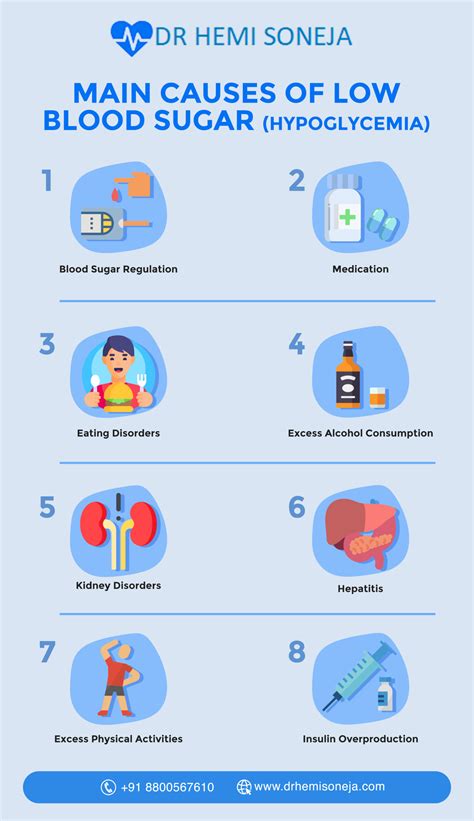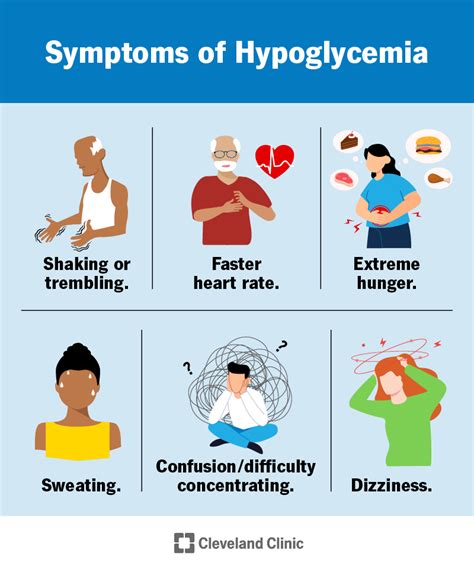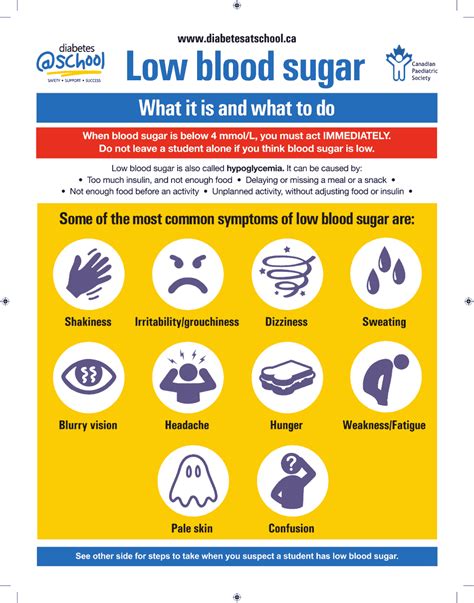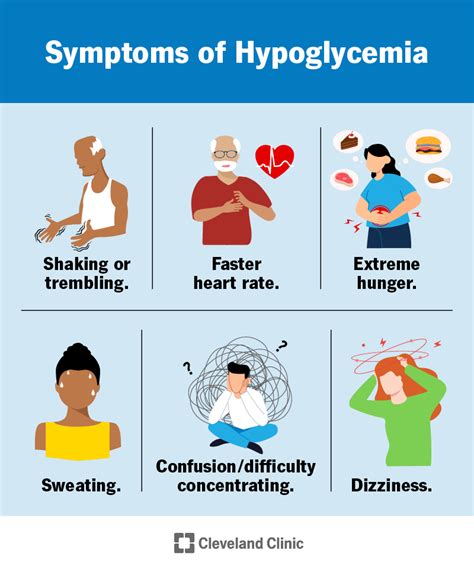Intro
Discover the causes of low blood sugar levels, including hypoglycemia symptoms, diet, and health conditions that affect glucose levels, insulin sensitivity, and glucose metabolism, to manage and prevent dangerous blood sugar drops.
Maintaining healthy blood sugar levels is crucial for overall well-being. When blood sugar levels drop below normal, it can lead to a range of symptoms and health issues. Low blood sugar, also known as hypoglycemia, occurs when the body's glucose levels fall below 70 milligrams per deciliter (mg/dL). Understanding the causes of low blood sugar levels is essential for preventing and managing this condition.
Low blood sugar can be caused by various factors, including medical conditions, medications, and lifestyle choices. For instance, people with diabetes are more prone to experiencing low blood sugar due to the medications they take to manage their condition. Additionally, certain medical conditions, such as hypothyroidism and adrenal insufficiency, can increase the risk of developing low blood sugar. It is essential to recognize the signs and symptoms of low blood sugar, which can include shakiness, dizziness, sweating, and confusion.
Recognizing the causes of low blood sugar is crucial for taking preventive measures and seeking medical attention when necessary. By understanding the underlying factors that contribute to low blood sugar, individuals can make informed decisions about their diet, exercise, and medication regimen to maintain healthy blood sugar levels. Moreover, being aware of the symptoms and risks associated with low blood sugar can help individuals take prompt action to prevent complications and ensure timely medical intervention.
Causes of Low Blood Sugar

Low blood sugar can be caused by various factors, including medical conditions, medications, and lifestyle choices. Some of the most common causes of low blood sugar include:
- Medications: Certain medications, such as insulin and sulfonylureas, can cause low blood sugar as a side effect.
- Medical conditions: Conditions like hypothyroidism, adrenal insufficiency, and hypopituitarism can increase the risk of developing low blood sugar.
- Diet: Eating too little food, skipping meals, or consuming high amounts of sugar and refined carbohydrates can lead to low blood sugar.
- Exercise: Engaging in strenuous physical activity without adequate food intake can cause low blood sugar.
- Alcohol consumption: Drinking excessive amounts of alcohol can lead to low blood sugar, especially when combined with certain medications.
Medical Conditions that Increase the Risk of Low Blood Sugar

Certain medical conditions can increase the risk of developing low blood sugar. These conditions include:
- Hypothyroidism: An underactive thyroid gland can increase the risk of low blood sugar.
- Adrenal insufficiency: A condition where the adrenal glands do not produce enough hormones can lead to low blood sugar.
- Hypopituitarism: A condition where the pituitary gland does not produce enough hormones can increase the risk of low blood sugar.
- Gastroparesis: A condition where the stomach muscles are weakened, leading to delayed stomach emptying and increased risk of low blood sugar.
Symptoms of Low Blood Sugar

The symptoms of low blood sugar can vary from person to person, but common signs and symptoms include:
- Shakiness: Feeling shaky or trembling
- Dizziness: Feeling lightheaded or dizzy
- Sweating: Excessive sweating
- Confusion: Feeling disoriented or confused
- Headache: Experiencing a headache
- Fatigue: Feeling weak or tired
Treatment and Prevention of Low Blood Sugar

Treatment and prevention of low blood sugar involve a combination of lifestyle changes, medication adjustments, and medical interventions. Some strategies for preventing low blood sugar include:
- Eating regular meals: Consuming balanced meals and snacks to maintain stable blood sugar levels
- Monitoring blood sugar levels: Regularly checking blood sugar levels to identify potential issues
- Adjusting medication: Working with a healthcare provider to adjust medication regimens to minimize the risk of low blood sugar
- Staying hydrated: Drinking plenty of water to help regulate blood sugar levels
Risks and Complications of Low Blood Sugar

If left untreated, low blood sugar can lead to serious complications, including:
- Seizures: Low blood sugar can cause seizures, especially in people with a history of seizure disorders.
- Loss of consciousness: Severe low blood sugar can lead to loss of consciousness or coma.
- Brain damage: Prolonged low blood sugar can cause brain damage or death.
- Cardiovascular problems: Low blood sugar can increase the risk of cardiovascular problems, including heart attack and stroke.
Managing Low Blood Sugar in Special Populations

Managing low blood sugar requires special consideration in certain populations, including:
- Pregnant women: Pregnant women with diabetes or other medical conditions that increase the risk of low blood sugar require close monitoring and management.
- Older adults: Older adults may be more susceptible to low blood sugar due to age-related changes in glucose metabolism and medication use.
- Children: Children with diabetes or other medical conditions that increase the risk of low blood sugar require close monitoring and management to prevent complications.
Conclusion and Next Steps

In conclusion, low blood sugar is a serious medical condition that requires prompt attention and management. By understanding the causes, symptoms, and risks associated with low blood sugar, individuals can take proactive steps to prevent and manage this condition. If you or someone you know is experiencing symptoms of low blood sugar, it is essential to seek medical attention immediately. Additionally, individuals can take steps to prevent low blood sugar by eating regular meals, monitoring blood sugar levels, and adjusting medication regimens as needed.
We invite you to share your thoughts and experiences with low blood sugar in the comments below. If you have any questions or concerns, please do not hesitate to reach out. By working together, we can raise awareness and promote education about this important health topic.
What are the symptoms of low blood sugar?
+The symptoms of low blood sugar can include shakiness, dizziness, sweating, confusion, headache, and fatigue.
What causes low blood sugar?
+Low blood sugar can be caused by various factors, including medications, medical conditions, diet, exercise, and alcohol consumption.
How can I prevent low blood sugar?
+To prevent low blood sugar, individuals can eat regular meals, monitor blood sugar levels, adjust medication regimens as needed, and stay hydrated.
